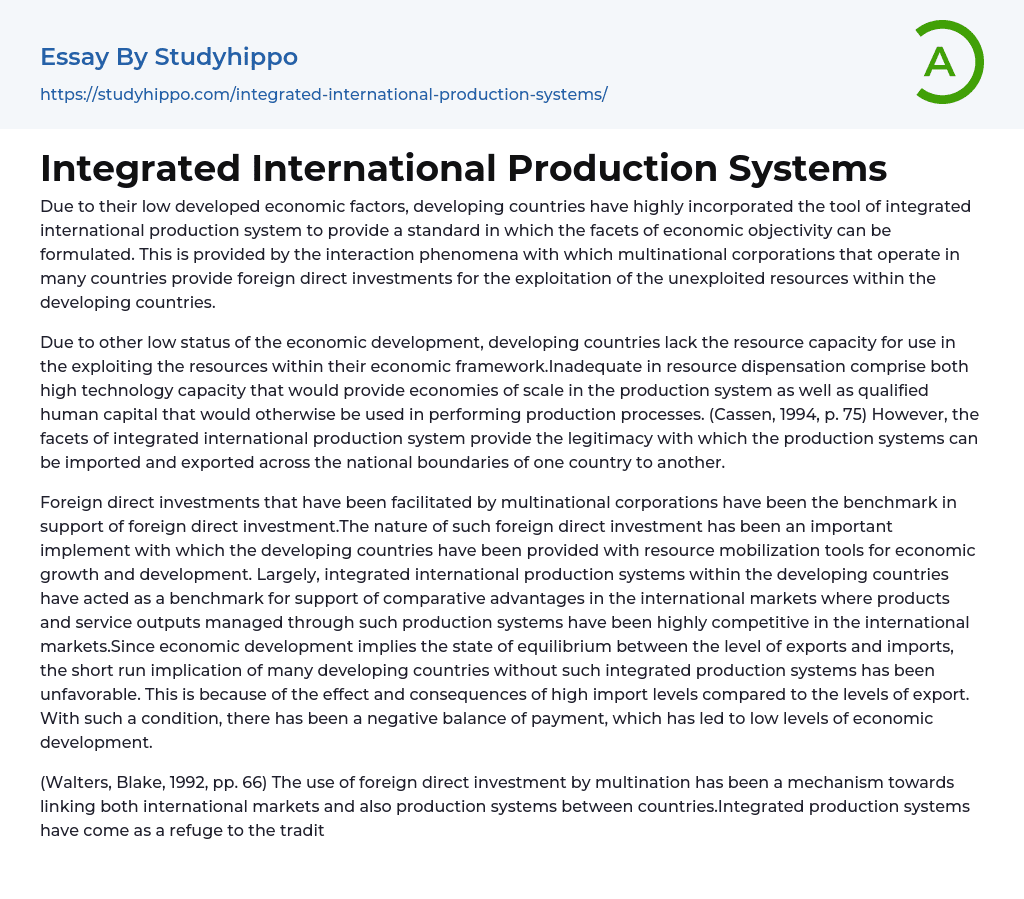Developing countries rely heavily on integrated international production systems to establish objective economic standards due to their underdeveloped economies. This is achieved through interactions with multinational corporations that operate in multiple countries and provide foreign direct investments for the exploitation of the untapped resources in developing countries.
Developing countries face a resource capacity deficiency which hinders the exploitation of resources within their economic structure. This deficiency encompasses insufficient resource allocation in terms of advanced technology that would enable economies of scale in the production process, and a lack of competent human capital for executing production processes (Cassen, 1994, p. 75). Nonetheless, integrated international production systems legitimize the import and export of production systems across national borders.
Multinational corporations have played a vital role in supporting foreign direct investment. This investment approach has been crucial in equipping developing countries
...with resource mobilization tools for economic growth and development. Integrated international production systems in these countries serve as a benchmark for promoting comparative advantages in international markets. By producing highly competitive products and services, these systems have helped maintain economic equilibrium between exports and imports. However, many developing countries without such systems face unfavorable short-term outcomes due to high import levels relative to exports. This leads to negative balance of payment and consequently, low levels of economic development.
(Walters, Blake, 1992, pp. 66) Multinational corporations have used foreign direct investment to connect international markets and production systems. Integrated production systems have replaced traditional systems, where countries pursued their own mobility in production. This shift has negatively impacted economic development in developing countries that lack adequate structures to produce competitive products on an international level. However, the current global economic climate
supports complex integration strategies for production purposes.
The incorporation of both horizontal and vertical production processes has brought about labor division and value chain economics, leading to a more competitive production system in developing nations. The integration of international production has been made possible through the application of complex corporate capabilities that explore both global and regional economic specialties. This has resulted in an interconnectivity of production systems within firms located in developing countries. The primary objective of these integrated production systems is to provide a standardized approach towards globalizing the world economy. As such, the development of integrated production systems in developing countries has provided a value-enhancing strategy that aligns with the pertinent scope of the global economy.
(Holton, 2005, p. 59) Developing countries have benefited from exchanging economies of scale in the global economy, leading to better economic feasibility. The integration of production systems has been key in achieving this, supplementing the impacts of international trade. This has been possible thanks to foreign direct investment, which has helped establish lasting relationships between developing nations and the global economy through the exchange of production factors across borders. This process has also facilitated the establishment of economically sustainable relationships between countries under global corporate entities. (Baylis, Smith, 2006, p.)
8) The integration of production systems has led to capital inflows, technology, and human capital skills into developing countries, which has helped stabilize the relationship between their exports and imports. Utilizing these capital inflows, developing countries have been able to increase their participation in international trade. Due to low standards in production and economic development, developing countries have not had optimal production systems that would allow them to
compete internationally. However, the use of an integrated international production system has provided a solution by supplying developing countries with the necessary factors of production from the global portfolio.
According to Dicken (1996, pp. 137), production systems have often been utilized as a means of promoting economic development in developing nations. This approach allows them to effectively utilize available resources and subsequently lead to economic growth. Integrated production systems, facilitated through foreign direct investment, offer a robust framework for expanding opportunities and capabilities within the global economy.
According to Wallace (1992, pp. 43), the establishment of economic linkages between developing nations and the rest of the world has offered a significant opportunity for economic growth. Baylis, J. and Smith, S. are credited with providing the reference.
(2006) An Introduction to International Relations: The Globalization of World Politics, published by Oxford University Press and containing 8 pages. Additionally, Clarendon Press published a report titled "Does Aid Work?" by R. Cassen in 1994, which spans 75 pages. P. Dicken also contributed to this topic.
The book "Global Shift: Industrial Change in a Turbulent World" was published in 1996 by Paul Chapman Publishing Ltd. It has a total of pp. pages.
137 Holton, R. J. (2005) created the book "Making Globalization" (published by Palgrave) which includes page 59. Additionally, I. Wallace (1992) authored "The Global Economic System" (published by Routledge), which includes an unspecified number of pages.
Walters, R. S. and Blake, D. H. 43
The Politics of Global Economic Relations by Prentice-Hall International, published in 1992 and with a page count of 66.
- Afghanistan essays
- Africa essays
- America essays
- Asia essays
- Australia essays
- Caribbean essays
- City essays
- Developing Country essays
- Dubai essays
- Earthquake essays
- Europe essays
- Fracking essays
- Georgia essays
- Middle East essays
- Natural Disaster essays
- New Zealand essays
- North Korea essays
- South Korea essays
- Thailand essays
- Travel essays
- Asset essays
- Capital market essays
- Day Trading essays
- Depreciation essays
- Discounted Cash Flow essays
- Foreign Direct Investment essays
- Funds essays
- Futures Trading essays
- Internal Rate Of Return essays
- Million essays
- Revenue essays
- Anthropology essays
- Audience essays
- Charity essays
- Cultural Competence essays
- Emile Durkheim essays
- Gender Roles essays
- Generation essays
- Globalization essays
- Interpersonal Relationship essays
- People essays
- Race essays
- Social Change essays
- Social Class essays
- Social Movement essays
- Social Science essays
- Social Status essays
- Social Stratification essays
- Society essays
- Sociological Imagination essays




